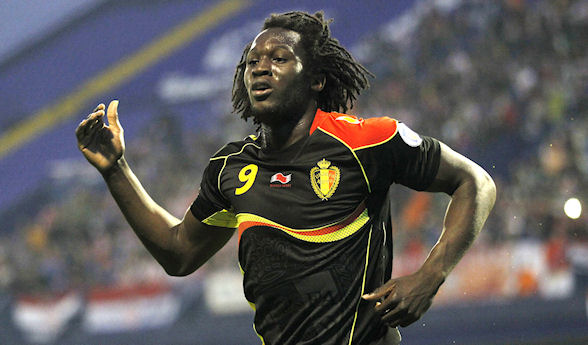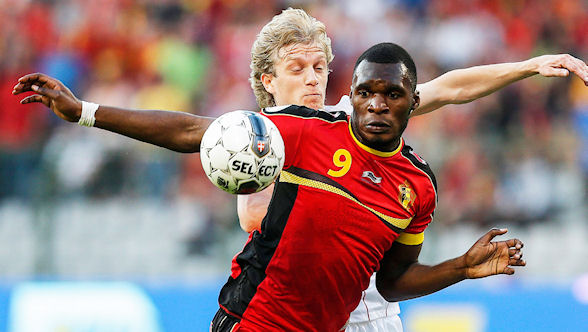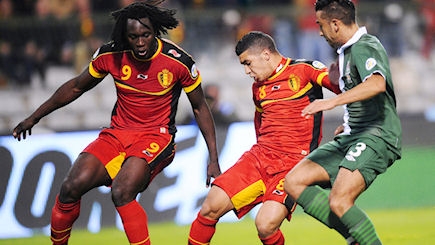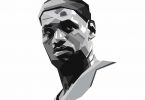This article first appeared in the Jan/Feb 2014 issue of World Gaming magazine.
Once blessed with talented football players such as Enzo Scifo and Jan Ceulemans, Belgium hasn’t ranked among the elite football nations for quite some time. But recently, more and more Belgian footballers with enormous talent have been making their mark in Europe’s top leagues and the English Premier League in particular. It comes as no surprise then that the European Red Devils, who were once a fearful force back in the 1980s, qualified for the 2014 World Cup undefeated.

Mark Wilmots, who was a key player for Belgium in the 1990s and spent most of his playing time in Germany’s Bundesliga, took over from his compatriot Georges Leekens as manager of the under-performed national team back in 2012. Now he faces a very different problem – with so many talented players, how can he fit them all into the first 11? And who will act as their leading striker in the 2014 World Cup – Christian Benteke or Romelu Lukaku? It is a fascinating question.
Born in 1990 and 1993 respectively, Benteke and Lukaku share the same body shape and playing style. They are just as strong and forceful as the African monster Didier Drogba. When Chelsea spent big to get Lukaku, they saw him as the ideal future replacement for former Blues talisman Drogba. This season he is on loan at Everton, while Benteke could soon find himself on the way out of Villa Park with a number of bigger clubs circling. At such a tender age, playing regular football at a relatively small club might be a better choice than sitting on the bench elsewhere but he is certainly making his presence felt.
It is difficult for any manager to feature two big target men at the same time but for Wilmots, putting either Lukaku or Benteke on the bench would be a huge waste of talent. Somehow he found a way to fit them both into a recent friendly match and found that Benteke was willing to play behind and create chances for his strike partner. Problem solved! Two strong strikers can be great assets for a club. Manchester United, for example, enjoyed the partnership of Andy Cole and Dwight Yorke, two great goal scorers with similar playing styles at their peak.

Romelu Lukaku
Wilmots is enjoying a golden period of Belgian football. Even the famous European Red Devils of the 1980s produced very few players with this sort of flair and technique. Other than Enzo Scifo, Jan Ceulemans and Jean-Marie Pfaff, the rest were hard and rough much like the footballing style of their then-neighbor West Germany. How things have turned upside down as this current Belgium side isn’t short on creativity and flair, with their all-round players perfectly suited to modern day football.
In many ways, the Premier League suits this crop of Belgian players more than the Spanish or Portuguese leagues. This is because most of the Belgian footballers are blessed with outstanding technique as well as a resilience and toughness inherited from their football predecessors. Lightweight talents such as Eden Hazard and Kevin De Bruyne are now the driving force at Chelsea, while tough men Vincent Kompany, Thomas Vermaelen, Marouane Fellaini and Jan Vertonghen have become the defensive foundations of their English clubs. The current national side has 12 players playing for Premier League clubs, although one of them, goalkeeper Thibaut Courtois, has been loaned out to Atlético Madrid by Chelsea.
So, what is the secret to having so many Belgian players coming of age all of a sudden? It seems there is a similar upward trajectory between Belgium and Germany, who shared the same footballing philosophies back in the 1980s and 1990s and have both developed a more technical approach to the game in the new millennium. The revolution of their youth training system is the key reason behind their great success.
Humiliated at the 2000 European Cup when the disastrous German side finished bottom of their group without winning a game, the German Football Association was determined to make wholesale changes to the country’s youth training system, a story WGM featured in our Jul/Aug issue last year. Belgium went the same route as their glorious past was left behind and they failed to qualify for the 2006 and 2010 World Cups as well as the 2004, 2008 and 2012 European Cups.
The revolution started at club level in 2000 when the football authority stipulated all clubs – including local big guns such as Anderlecht and Standard Liège – must play a 4-3-3 formation at all youth levels. In addition, they required youth teams play on smaller-sized pitches. This is a great way to develop technical players as Germany, Spain and now Belgium have all proved. Nowadays, the application of small pitches into the youth training system is being widely discussed in England but the conservative England Football Association has so far remained reluctant to change the norm.

Christian Benteke
There is another reason behind the rise of Belgium football which may easily be overlooked – a renewed unity within the dressing room. Belgium was historically divided into two halves: the Dutchspeaking northern region called Flanders and the French-speaking southern part named Wallonia. The old Flemish-Walloon tension has been reflected across the nation as a whole, including in the national football team. However, with many Belgians now playing in the same league and speaking the same language – English rather than French or Dutch – the tension has gradually eased. Meanwhile, more and more immigrants have been called into the national team. Benteke, Kompany and Lukaku all share Congolese roots, while Fellaini was born to Moroccan parents. Axel Witsel, who moved to Zenit Saint Petersburg for €40 million last year, has Caribbean ancestry. All of these players have been less ingrained with the old geographic conflict than their predecessors.
While the focus in the lead-up to next year’s World Cup will be on the big guns such as Spain, Brazil and Argentina, keep an eye on the new European Red Devils. With so many talented names from the Premier League in their line-up, they could well prove to be the dark horse.







